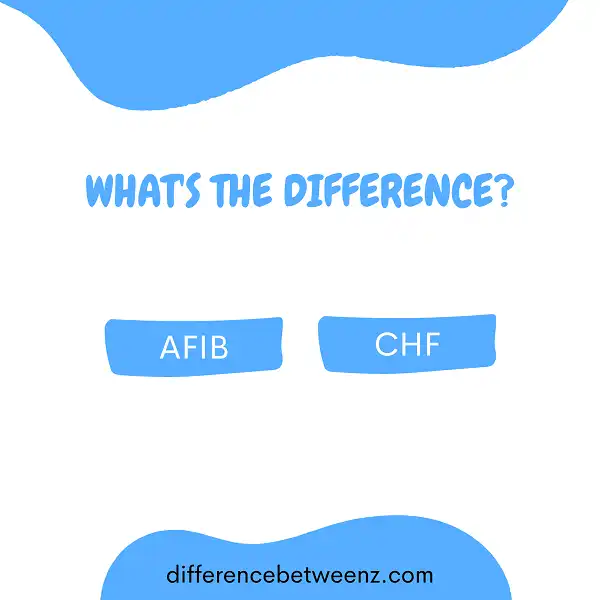Are you confused about the difference between Afib and CHF? Do you feel lost about what these two conditions are, even though they sound similar? If so, don’t worry. In this blog post, we’ll explain exactly what each condition is and how they differ from one another. We’ll also look at the causes and treatments of both conditions to ensure you’re fully informed on all aspects. By the end of this article, you will understand not only the fundamental differences between Afib and CHF but also some key pieces of information regarding each disease.
What is Afib?
Afib, or atrial fibrillation, is a type of arrhythmia whereby the heart does not beat in a cohesive pattern. To put it simply, Afib is when the heart beats unevenly or too fast. As Afib affects the rhythm of the heart, it can cause shortness of breath, dizziness or lightheadedness, fatigue, palpitations― feeling like one’s heart skipped a beat ― chest pain or pressure, and even clots in some cases.
Afib can be dangerous and should be taken seriously; it requires medical attention from professionals to properly treat. Thankfully, Afib patients have several treatment options available nowadays such as catheter ablation to take care of their condition so that they can lead healthy lives.
What is CHF?
- CHF, or Congestive Heart Failure, is a condition in which the heart fails to pump enough blood and oxygen throughout the body. CHF is caused by several different factors, including high blood pressure, coronary artery disease (CAD), diabetes, age-related changes in cardiac muscle structure, or genetics.
- Symptoms of CHF can vary but often include shortness of breath during activity, swelling in the legs and feet due to fluid retention, fatigue, chest pain or discomfort from an irregular heartbeat, or other cardiovascular symptoms or issues.
- CHF is serious but there are options available for treatment that range from taking medication and changing lifestyle habits to surgery and pacemaker implantation. It’s important for those living with CHF to communicate regularly with their doctor about best practices for managing symptoms each day.
Difference Between Afib and CHF
Afib (Atrial Fibrillation) and CHF (Congestive Heart Failure) may sound similar, but the two conditions have very different symptoms and treatments.
- Afib causes abnormal heart rhythm, while CHF prevents the heart from pumping blood effectively.
- Afib can be easily detected using an electrocardiogram, whereas the diagnosis of CHF is based on one’s medical history, physical exam results, and other tests like X-ray imaging.
- Afib treatment usually involves medications that help restore the heart rhythm or prevent blood clots, while managing CHF focuses on improving symptoms with a combination of lifestyle changes, medications, and other therapies.
Since Afib increases one’s risk for stroke, it is important to be aware of these differences in order to reduce such risks by getting the right treatment for each condition.
Conclusion
Atrial fibrillation (Afib) and congestive heart failure (CHF) are two very different conditions. While both can cause shortness of breath, fatigue, and a feeling of lightheadedness or dizziness, the treatments for each are entirely different. It’s important to know which you are experiencing so that you can get the proper treatment. If you have any questions about your symptoms or aren’t sure which condition you may have, be sure to talk to your doctor.


